Book contents
- Frontmatter
- Contents
- List of contributors
- Foreword by Leon M. Lederman
- Editors' acknowledgments
- Photographs of the symposium
- List of abbreviations
- List of notation
- I Introduction
- 1 Pions to quarks: particle physics in the 1950s
- 2 Particle physics in the early 1950s
- 3 An historian's interest in particle physics
- II Particle discoveries in cosmic rays
- III High-energy nuclear physics
- IV The new laboratory
- V The strange particles
- VI Weak interactions
- VII Weak interactions and parity nonconservation
- VIII The particle physics community
- IX Theories of hadrons
- X Personal overviews
- Name index
- Subject index
3 - An historian's interest in particle physics
Published online by Cambridge University Press: 07 May 2010
- Frontmatter
- Contents
- List of contributors
- Foreword by Leon M. Lederman
- Editors' acknowledgments
- Photographs of the symposium
- List of abbreviations
- List of notation
- I Introduction
- 1 Pions to quarks: particle physics in the 1950s
- 2 Particle physics in the early 1950s
- 3 An historian's interest in particle physics
- II Particle discoveries in cosmic rays
- III High-energy nuclear physics
- IV The new laboratory
- V The strange particles
- VI Weak interactions
- VII Weak interactions and parity nonconservation
- VIII The particle physics community
- IX Theories of hadrons
- X Personal overviews
- Name index
- Subject index
Summary
The symposium on which this volume is based was the fourth large meeting sponsored by physicists and devoted to the history of nuclear or particle physics. Many of the historians who attended earlier meetings came away with the impression that their hosts considered them to be passive receptacles for the true stuff of history (namely, reminiscences and recollections) or active clerks, able to look up bibliography, spell, and get dates right. This was a violation of parity between physicists and historians in the study of the past, and it resulted, of course, in weak interactions. I shall take the opportunity provided by the democratic action of this symposium's organizers to say a few words about the methods and objectives of historians. I shall then mention a few aspects of the history of particle physics particularly interesting to historians.
Although physics and history aim at different things, there are important parallels between them. Classical physics may have its analogue in dynastic history, the concern with rulers, courts, diplomacy, and wars characteristic of the historians of the nineteenth century, a concern that eventually made some people as impatient, and showed itself as limited, as the physics of mass points. While physicists extended their work to the domains of relativity and the quantum, historians brought social, economic, and institutional forces to center stage. Historians of physics underwent this revolution – which took them from exclusive concern with great men and battles of ideas to consideration of the milieu as well as the content of science – about twenty-five years ago.
- Type
- Chapter
- Information
- Pions to QuarksParticle Physics in the 1950s, pp. 47 - 54Publisher: Cambridge University PressPrint publication year: 1989
- 1
- Cited by



